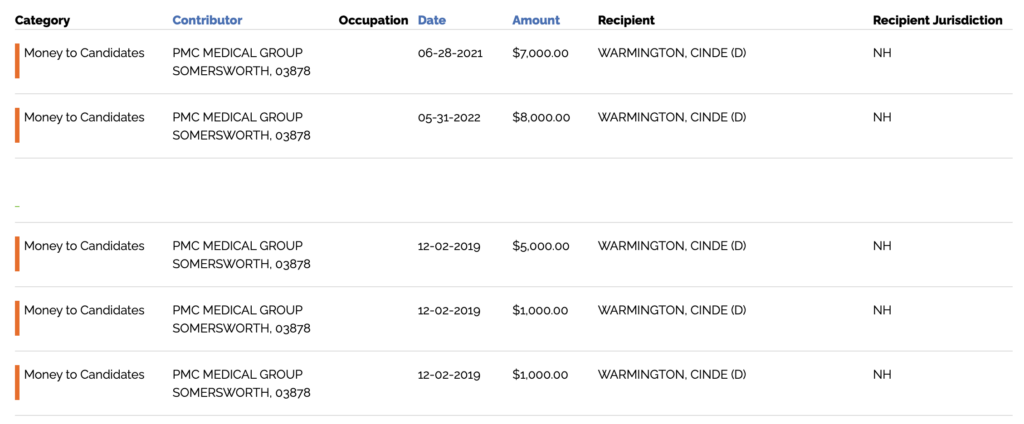When the U.S. Supreme Court heard the case earlier this month challenging a proposed Purdue Pharma bankruptcy settlement paying billions to families harmed by the opioid crisis the company helped create, Justice Elena Kagan summed up the court’s dilemma.
“Among people who have no love for the Sacklers, among people who think that the Sacklers are pretty much the worst people on Earth, they’ve negotiated a deal which they think is the best that they can get,” Kagan said.
The Sackler family still owned Purdue Pharma when it flooded the U.S. with Oxycontin, and one person who worked for them at the time now wants to be the Granite State’s governor: Executive Councilor Cinde Warmington.
A veteran of the Obama White House like Kagan, Warmington is a Democrat and an attorney. As The Keene Sentinel and the Daily Beast have previously reported, when the Sacklers were pushing opioids to doctors’ offices and medical clinics, she was testifying before the New Hampshire legislature in 2002.
“I’m from the law firm Shaheen & Gordon, and I have been retained to represent Purdue Pharma, the maker of Oxycontin,” Warmington told the Senate Committee on Executive Departments and Administration during a hearing on HB 1218. When Sen. Sylvia Larsen (D-Concord) asked if she “would consider Oxycontin, a well-known drug, to have a high potential for misuse or abuse,” Warmington defended her client’s product and blamed media coverage.
“To say that Oxycontin has been abused, it certainly has been — in the press,” Warmington told the senators. “I think that we can all say that [Oxycontin] is a drug of abuse, as are all narcotics.”
She also said it was “a drug that has truly been a medical breakthrough for patients who need it” and called limiting access to Oxy “inappropriate.”
In fact, the Oxycontin disaster led to as many as 453,300 deaths between 2000 and 2016. Thanks to case discovery in the lawsuit, Purdue Pharma knew all along that Oxycontin was highly addictive, despite the company selling it as “safe, effective and generally non-addicting.”
No New England state spent more per capita on the opioid crisis than New Hampshire. According to a 2017 Center for Disease Control report, the state spent $5,381 per person to pay for opioid deaths and treatment, compared to second-place Massachusetts, which spent $5,099 per capita. Some 424 people died of opioid overdose in the state. The CDC study said only Massachusetts and Connecticut recorded more deaths in New England.
Years — and untold earnings from the Sackler family — later, Warmington is now running in the Democratic gubernatorial primary as a self-described “health care advocate” and lifelong health care attorney. And she is promising to end the fentanyl crisis in the state.
Interestingly, one of her biggest donors runs two treatment facilities. PainCare and Granite State Pain Associates are both owned by PMC Medical Group. According to Open Secrets, a site that collects data on campaign contributions, since December 2019, Warmington has received tens of thousands of dollars in donations from PMC Medical and its owner, the late Dr. Michael J. O’Connell.


Warmington has received at least $22,000 from PMC and another $17,000 from O’Connell.
In the Democratic gubernatorial primary, Warmington is facing off against another Democrat with a problematic record on opioids and addiction, Manchester Mayor Joyce Craig. The Queen City suffered multiple surges in opioid overdoses and deaths on her watch. In October, for example, AMR reported Manchester suffered the highest one-month total in opioid overdoses since August 2018.
That was one reason Craig’s handpicked successor, Alderman Kevin Cavanaugh, lost the mayor’s race to Republican Jay Ruais in this heavily Democratic city. Ruais, who had his own struggle with addiction, made addressing the city’s opioid crisis a top priority.
Warmington’s campaign did not respond to requests for comment. Shaheen & Gordon also did not respond.
Former New Hampshire Attorney General Joe Foster, a Democrat backing Warmington, said in a statement, “Attorneys should not be attacked for the actions of their clients.”
But what about lobbyists? As the Daily Beast reported, when questions were being raised about the risks of Oxycontin, “Purdue began dispatching legions of lobbyists to state legislatures to defend the drug. In New Hampshire, one of those lobbyists was Cinde Warmington.”
The Republicans running for governor are very aware of Warmington’s background as a Big Pharma lobbyist.
“Having Cinde Warmington as governor is akin to having a fox in the henhouse. Her friends, donors, and long-term associates are Big Pharma,” said GOP State Chairman Chris Ager. “She wants to tackle drug addiction in the state, yet she was part of the worst company that helped make that happen.”
Kelly Ayotte’s campaign spokesman, John Corbett, said, “Cinde Warmington knowingly spewed Purdue Pharma’s deadly lie that opioids were safe, effective, and non-addictive in exchange for being on the company’s lucrative payroll. Cinde’s lies and ties to Big Pharma will be soundly rejected by Granite Staters.”
Former state Senate President Chuck Morse added, “Corporate ties shouldn’t dictate public service, and while Purdue Pharma might get a sweetheart deal on the opioid pushing scandal, Cinde Warmington will have no such luck. This company is no better than the drug cartels pushing deadly fentanyl across our state and deserves the same severity of attention.”
With the COVID pandemic still in the recent memory of New Hampshire voters, faith in public health experts is in decline, according to health research pollsters KFF. In March, only 25 percent told a Harvard Chan School for Public Health poll that they “highly trusted” state public health experts.
“Try and imagine if there is another pandemic and Cinde was in charge,” said Ager. “If you liked the previous response to COVID in the state, then I would expect she would do whatever the big pharmaceutical companies recommend. That is the perspective she comes from, and I would expect that to continue in a pandemic.”





